News & Media
Remembering Mama Africa
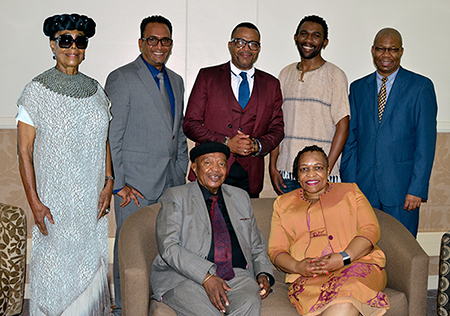
Back from left: Abigail Kubeka, Prof Vinesh Basdeo (Executive Dean, College of Law, Unisa), Macks Papo (Event Facilitator), Zingisa Nkosinkulu & Dr Olaotse Kole (Acting Deputy Executive Dean, College of Law, Unisa); Front from left: Dr Jonas Gwangwa & Khanya Mahlare (Executive Director: Department of Institutional Advancement, Unisa)
Unisa, the Sowetan and the Institute for Dispute Resolution in Africa hosted a dialogue remembering Miriam Makeba on 4 March 2019, a day that would have been her 87th birthday. The event took the form of a screening of the documentary, Mama Africa: Miriam Makeba, and was followed by an inter-generational dialogue between her peers and the younger generation.
In his welcome address, College of Law Executive Dean, Prof Vinesh Basdeo, said that Unisa was proud to commemorate the life of a legend and stalwart of the African struggle, Miriam Zenzile Makeba, arguably one of the most talented artists of our time. "From humble beginnings, when as a toddler she spent time in prison with her mother who was arrested for selling beer and losing her father when she was around six years old, Miriam Makeba epitomises the determination of our people to reach greater heights despite all the odds, and the systematic impediments placed upon them by the system of apartheid, declared a crime against humanity by the United Nations," Basdeo illustrated.
Representing her peers on the panel of speakers were award-winning icons Dr Jonas Gwangwa, jazz musician, songwriter and producer, and Abigail Kubeka, singer, songwriter and actress. Rounding out the panel were Zingisa Nkosinkulu, Nomsa Mwamuka, Makeba’s granddaughter, Zenzi Lee Makeba, and her great-grandson, Lindelani Makeba Lee. The enthusiastic audience included local school learners.
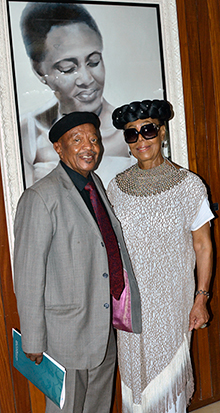
Dr Jonas Gwangwa and Abigail Kubeka in front of the portrait of Mama Africa by Amita Makan that graces the foyer of Unisa’s Dr Miriam Makeba Concert Hall
The documentary portrays Makeba as a humanitarian and activist who began her music career singing for her cousin’s band, the Cuban Brothers. She later sang for the Manhattan Brothers and began to build a reputation. She toured South Africa, Zimbabwe and the Congo with the band until 1957. After this Makeba sang for all-women group, the Skylarks, which combined jazz and traditional African melodies.
Makeba was the first black musician to leave South Africa on account of apartheid, and over the years many others followed her. A giant of her times, Makeba’s impact went beyond music; it expanded into politics, education and humanitarian work. She used her voice to draw the attention of the world to the injustices of apartheid.
"Wherever Miriam Makeba was, one could be certain that through art, song and dance, she would miss no opportunity to mobilise people of the world behind the banner of the just cause for national liberation and in defence of our dignity and pride," enthused Basdeo.
Against this backdrop, Kubeka spoke strongly on how South Africa did not do enough to honour Makeba while she was still alive. "There was no respect, no honour, and no 'thank you'. For Miriam, the people who celebrated her were those from overseas and in other parts of Africa but not here at home," she lamented.
Reminiscing about her ubuntu, Gwangwa recalled going to America for the first time and being welcomed by Makeba, saying that he stayed at her house until he and the late Hugh Masekela found an apartment. "Makeba cared for a lot of people. There were students who came from different parts of Africa and stayed with her. She always had someone she looked after," he recollected.
Continuing with his commemorative address, Basdeo noted that "Makeba became a tireless fighter for the African continent; she was a living legend and a truly remarkable person, and she was not only recognised for her music but received the Dag Hammarskjöld prize and many others for her social and humanitarian work. There’s a lot to learn from Mma Afrika. We can rise from whatever background and circumstance if we use our talent and fame for the benefit of humanity. Mama Afrika taught us to love ourselves as Africans and that we are as good as anyone and that we can be the best as she was the best. Mama Afrika taught us that 'Yes we can'," applauded Basdeo.
To the delight of the audience, facilitating the event was renowned actor Macks Papo and serenading guests in euphoric African music was the much loved Rhythmic Elements.
The Unisa-Sowetan Dialogues series aims to begin an informed debate on the meaning and importance of history in shaping South Africa's present and future.
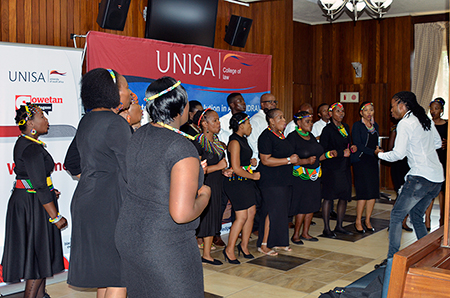
The Unisa Choir serenades guests as they arrive at the Unisa-Sowetan Dialogue commemorating the late Miriam Makeba.
*By Tshimangadzo Mphaphuli, Senior Journalist, Department of Institutional Advancement
Publish date: 2019-03-06 00:00:00.0

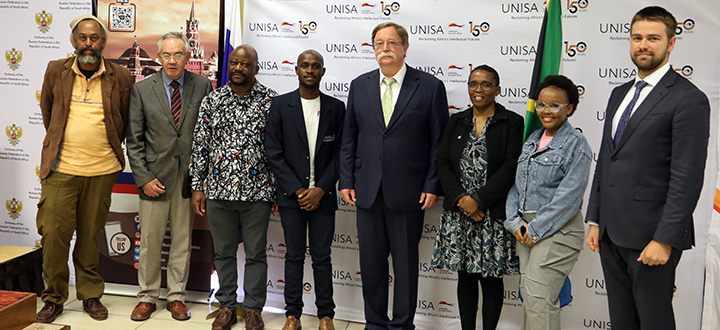 Unisa's student leadership engage with Russian ambassador
Unisa's student leadership engage with Russian ambassador
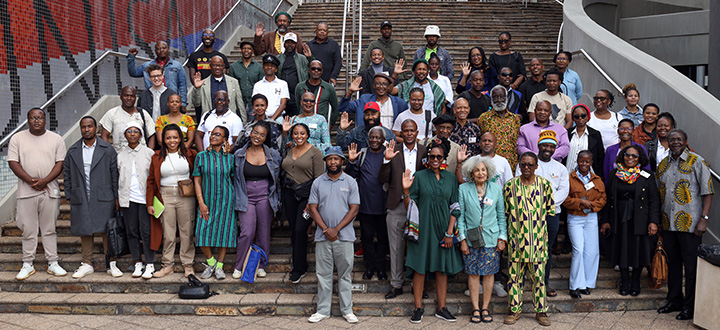 Re-igniting and re-imagining Pan Africanism, Afrocentricity and Afrofuturism in the 21st century
Re-igniting and re-imagining Pan Africanism, Afrocentricity and Afrofuturism in the 21st century
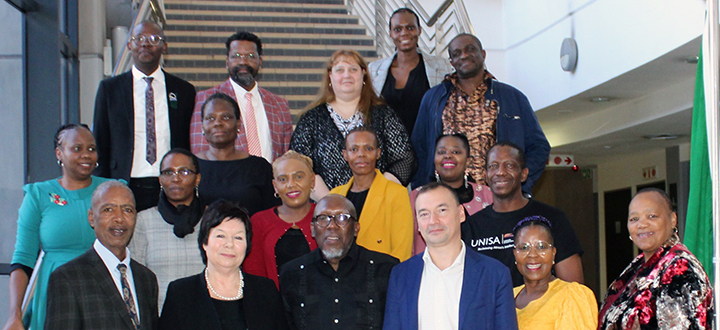 Unisa and Russian State University for the Humanities explore collaborative opportunities
Unisa and Russian State University for the Humanities explore collaborative opportunities
 Young Unisa science stars join elite Lindau Nobel Laureate group
Young Unisa science stars join elite Lindau Nobel Laureate group
 Education MEC addresses Unisa autism seminar
Education MEC addresses Unisa autism seminar